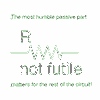-
The Hack Chat FAQ
09/23/2020 at 18:30 • 10 comments- What is a Hack Chat?
- Hack Chat is a weekly online chat session where people discuss the interesting things they're doing with the Hackaday community. Hack Chats are fun, informal text-chat sessions that let hackers connect and interact in an in-depth way.
- Who is a Hack Chat for?
- Everyone! If you read articles on Hackaday.com or post projects on Hackaday.io, chances are pretty good you'll get something from every Hack Chat.
- What is Hack Chat about?
- Literally everything! We strive to invite a wide range of hosts and cover the hardware hacking universe, and every week is different. One week we could be talking about homebrew radio telescopes, the next we could be discussing the relative merits of different PCB finishing methods. The only thing that's constant about Hack Chat is that it's always interesting.
- Who should host a Hack Chat?
- Anyone doing anything interesting. Although were certainly like to bring on people with cool jobs, you don't have to be an expert or have some deep knowledge of a topic to make a Hack Chat interesting. Whatever you're working on is probably great fodder for a Hack Chat.
- Is there video or audio for the Hack Chat?
- Generally, no. We like to keep the Hack Chat text-only wherever possible, because it seems more authentically hackerish. But we occasionally do set up "simulcast" Hack Chats with YouTube livestreams, especially for those topics that really need a live demo.
- Why should I attend a Hack Chat?
- Because it's fun and you'll learn a ton! Plus, you might just have the one bit of experience that nobody else has that will help move a project forward, or your question might spark a whole new discussion or lead the chat in a totally new direction. Hack Chat isn't a lecture -- it's a conversation. And every conversation needs two or more people to make it worth having.
- Why should I host a Hack Chat?
- Because it's fun and you'll learn a ton! Literally the first thing most people say after hosting a Hack Chat is how much fun they had, and how fast it all went by. On the more practical side, hosts often find they make valuable contacts with the community and find people who have just the right experience to solve a problem they've been stuck on. Hack Chat moves projects forward and helps stimulate collaboration and cooperation.
- When is Hack Chat?
- We do Hack Chats at noon Pacific time every Wednesday, with occasional breaks for holidays and such. We chose this time to make Hack Chat accessible to as many people around the world as possible. Hack Chats generally last for an hour, or for however long the host has to give.
- Where does the Hack Chat happen?
- On the Hack Chat public channel at https://hackaday.io/messages/room/2369
- Can I see previous Hack Chats?
- Absolutely! We pull a transcript at the conclusion of every Hack Chat and post them publicly here. Hack Chat transcripts are a great way to refer back to a link or a comment that you might have missed.
- How do I find out about upcoming Hack Chats?
- We promote Hack Chats on all our channels. Every Hack Chat gets an event page on Hackaday.io, so watching the events list is a great place to start. We also do a daily post early in the week of the Hack Chat on Hackaday.com; search by the Hack Chat tag to see a list of all the previous posts.
- How do I get reminders for Hack Chat?
- Everyone is busy, and we know it can slip your mind that Hack Chat is about to start. So we've got an email reminder that goes out a half-hour before every Hack Chat. If you want to get on the mailing list, sign up here.
- I want to host a Hack Chat. What should I do now?
- We've got an easy sign-up form for that. Just fill it out and someone will get back to you with specifics.
- We've got an easy sign-up form for that. Just fill it out and someone will get back to you with specifics.
- What's the deal with those cool posters for each Hack Chat?
- Aren't they great? Those posters are the work of Aleksandar Bradic, CTO of Supply Frame. He's got a graphics design background and likes to stay in practice, so he designs a custom poster for every Hack Chat. We think they're great, and he's actually thinking about publishing a compendium...
- What is a Hack Chat?
-
Hackaday.io Project Guidelines
07/13/2020 at 18:40 • 0 commentsThis will be a simple list of guidelines about what constitutes a legitimate project (as opposed to spam, advertisements, etc.). In conjunction with the Terms of Service and Code of Conduct, it will give users something to shoot for when creating and maintaining projects, and hopefully help increase the quality of Hackaday.io. It is not intended to be an exhaustive list, and is subject to change.
- Indirect advertisements: Hackaday.io will not accept any content that is obviously an advertisement for a third party. We understand that many hackers have sponsorship arrangements with various third-party entities, but we cannot allow Hackaday.io projects to serve as advertisements for these companies.
- Use of logos: Third-party logos are not allowed on Hackaday.io projects. Projects cannot display third-party logos, either directly and prominently or in the background of project photos, as a watermark, or in any way that's obvious to readers. Project-specific logos are fine, as long as there's no third-party sponsorship.
- Link farming: Project posts with little more than a series of links to a single third-party website are not allowed.
- Link dumping: A project whose only content is a single link to some other site presented with no context doesn't advance the state of the art. Worse than that, it's disrespectful to the rest of the Hackaday.io community, who put at least some effort into making projects that people like to read about. We don't have a problem with cross-linking from other project-hosting sites, like Hackster or GitHub. But we have to see at least some effort put into providing context for the Hackaday.io community.
- Off-topic projects: We at Hackaday.io are an eclectic bunch, and we celebrate all manner of hardware and software projects. We offer wide latitude when it comes to what types of projects people want to post, and we try to keep an open mind. However, some projects are clearly not within the realm of project types that most readers would find interesting. Such projects are subject to deletion on a case-by-case basis.
- Low-value projects: We understand that everyone is at a different point along their journey in the world of electronics and hardware hacking, and we don't want to judge the relative merits of any particular project. But some projects are obviously simple and quick to design, do not represent any substantial innovation, and are clearly designed only to sell PCBs or components. If a user consistently posts super simple circuits and never seems to make any apparent progress in their learning, that's another huge red flag to us.
- Obvious spamming: Multiple submissions of low-value projects by a single user in a short time frame are a huge red flag to us. First, it suggests to us that the user is just being paid by a third party to post a bunch of trashy projects. Second, it's a bad look. We recognize that some users will post multiple non-sponsored projects at the same time, but just be aware that this might be misinterpreted by the mods.
- Empty or incomplete projects: We get it -- not everyone has time to document a project in its entirety in a single sitting. We commonly see new projects that are just a "stub," a placeholder with just a title, and not even a thumbnail image. That's fine, but only for a while -- too many default thumbnails look bad, and a project that stays unpopulated too long is just a waste of valuable space. Stub projects that stay that way too long are subject to deletion.
- Plagiarism and AI-generated content: Any articles we find that are plagiarized from other sites without proper attribution will be immediately deleted. We'll also delete any AI-generated content, with the obvious exception of projects that explore machine learning systems for the edification of the community.
- The rest: At the risk of stating the obvious, we will immediately delete any project that contains or solicits anything offensive, harassing, racist, sexist, pornographic, or involving unethical hacking.
When a project...
Read more » -
Hackaday.io Code of Conduct
06/22/2020 at 19:08 • 0 commentsHackaday.io Code of Conduct
Last updated: February 27, 2023 || 14:00 PST
This document is a work in progress: our overall belief is that mutual respect and voices from all walks of life must be heard to create a balanced society. We want our community to be more diverse, whatever your background, we welcome you. We actively support an inclusive environment, and we want you to be a part of it.
All Hackaday.io members are required to agree with the following code of conduct, which will be enforced by Hackaday.io managers (Dusan, Dan ). We expect cooperation from all participants to ensure a safe environment for everybody.
Hackaday.io is dedicated to providing a harassment-free experience for everyone, regardless of race, gender, age, sexual orientation, disability, physical appearance, body size, knowledge of presented subject matter, or religion (or lack thereof). We do not tolerate harassment of participants in any form.
Cyberstalking, stalking, sexual language and imagery are not appropriate in our Hack Chat channel, in email, in private message, and other online media. Participants violating these rules will be sanctioned or expelled from Hackaday.io at the discretion of the managers.
Discussion or images related to sex, pornography, discriminatory language, or similar, can be seen as harassment, so please be considerate. If you intend to have any images related to sex or pornography in your project, please ask the managers if it is appropriate before posting.
Hackaday.io managers will delete any project or profile that has nudity, pornography, drugs, or references to illegal activity.
If you are being harassed, notice that someone else is being harassed, or have any other concerns, please let Hackaday.io staff know immediately, text 917.806.6210, or email conduct@hackaday.io.
Thanks!
Hackaday.io Managers
This document was based on the work of the XOXO Code of Conduct, Catskill Conference, the work of JSConf, Geek Feminism, confcodeofconduct.com, and inspired by resources provided by Ashe Dryden.
Licensed under a Creative Commons Attribution 3.0 Unported License.
My Projects
Projects I Contribute To
My Events
My Contests
My Lists
My Pages
Projects I Like & Follow
Share this profile
ShareBits
Become a Hackaday.io Member
Create an account to leave a comment. Already have an account? Log In.
Thank you for liking my project #Homemade Successive Approximation Register ADC !
Thank you for liking my Sol-20 Reproduction project.
Thank you for liking my project #Homemade Floating Point Interpreter for 6502 !
Thanks for your interest in my 2:5 Scale KENBAK-1 Personal Computer Reproduction project.
Really happy to see you follow my # Global radiation monitoring network , thanks!
Thank you so much for liking my Think-a-Tron 2020 project.
Hi Sophi !
I'm glad #YGREC8 is finally on your radar ;-)
Hi there :) this list needs some love, could you or @Adam Fabio please add me :) https://hackaday.io/list/8844-star-wars-projects
Hello :) could you please remove https://hackaday.io/project/1887-open-bicycle-computer from the homebrew cpu list? feels misplaced ;)
Wow, what an honor! Thank you for the like and follow :)

 Lutetium
Lutetium Aleksandar Bradic
Aleksandar Bradic Alexander
Alexander amith
amith Afreez Gan
Afreez Gan David Tucker
David Tucker Michael Gardi
Michael Gardi Mitsuru Yamada
Mitsuru Yamada Anool Mahidharia
Anool Mahidharia Marten Electric
Marten Electric Uri Shaked
Uri Shaked Kiyotaka Akasaka
Kiyotaka Akasaka K.O.
K.O. Bryan Howard
Bryan Howard Sam Ettinger
Sam Ettinger Koji Tokura
Koji Tokura Steven J Greenfield
Steven J Greenfield









Hello, I want to introduce my project of a 16 bit relay computer to your very useful list:
https://hackaday.io/project/189725-homebrew-16-bit-relay-computer
best regards from vienna